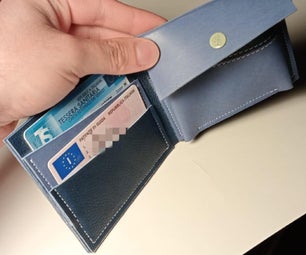Introduction: "Helicopter Seed" Spinning Toy
I'm a student at Vicksburg High School, and was very interested when I was challenged to compete in the "Make it Fly" contest. With such a vague description of what to make, I thought I would get creative...
You know those seeds that you see spinning down from trees every fall? That's what these are! When thrown they will spin towards the ground and slow themselves down. A simple project that demonstrates some interesting behavior in nature.
The Design
I started to do some research about how these spinning seeds actually worked, and I found this great article from NASA. This included designs for small spinners using a paperclip for weight, but I found that design to be finicky and it was unable to be scaled up.
I started the new design by sketching out the rough outline for the spinner on a piece of paper based on the paperclip spinners in the article. I then cut it out and kept adding pieces until it worked as I wanted it to. Then I took a picture of this prototype, and imported it into Fusion 360 as a canvas so that I could trace it in a sketch. I found the center of mass tool very helpful when I was playing around with the design to get it to work more consistently. From this sketch I was able to easily edit the design export it to be printed.
Supplies
Cardboard
Printer paper
Glue stick
Scissors
Box cutter (Optional but works better for cutting cardboard)
Step 1: Print Out the Template
Print out the attached template. Don't worry, it can be any size you want and it will still work fine. Just keep in mind that the larger it is the longer it will take to start spinning. I think it works the best when the biggest piece is about 5 inches long.
Step 2: Cut and Glue Your Template
Cut the paper down the middle so that only the large outline is left on one of the pieces. Glue the other half (the one with 3 outlines) to the cardboard so you can see the template. Note: I find that it is easier to cut out if the ribs on the cardboard run the short direction through the template (shown in the second picture).
Step 3: Cut Out the Pieces
Cut along the outside of each of the templates, and ignore the lines inside them. We'll use those later to help get everything lined up. You should be left with 3 cardboard pieces and 1 big piece of paper when you're done.
Step 4: Glue the Pieces Together
There's a few different steps here so hang in with me. Glue one of the smaller cardboard pieces into the outline on the larger one (first picture). That whole thing then gets glued into the outline on the sheet of paper (second picture). Once the glue dries, go ahead and flip this whole thing over. The last small cardboard piece will attached on the same end as the others, but because were on the back side now, you should see the brown side once it is glued on (third picture).
Step 5: Making It Fly
This step will vary depending on the size you chose to make your spinner. If it's small enough, you should be able to throw it up in the air and it will float its way back down. If its bigger though, it may need some extra help.
If just throwing it up didn't work you can try throwing it horizontally like a dart. This will get more air flowing around it and hopefully start it spinning. On the largest spinners, you might need to start it manually. Just pinch the end of the spinner and flick it clockwise. You should see it start to spin and speed up as it falls.
Given enough height any size spinner should pick up the speed to start spinning, so feel free to get creative.

This is an entry in the
Make it Fly Student Design Challenge









Comments